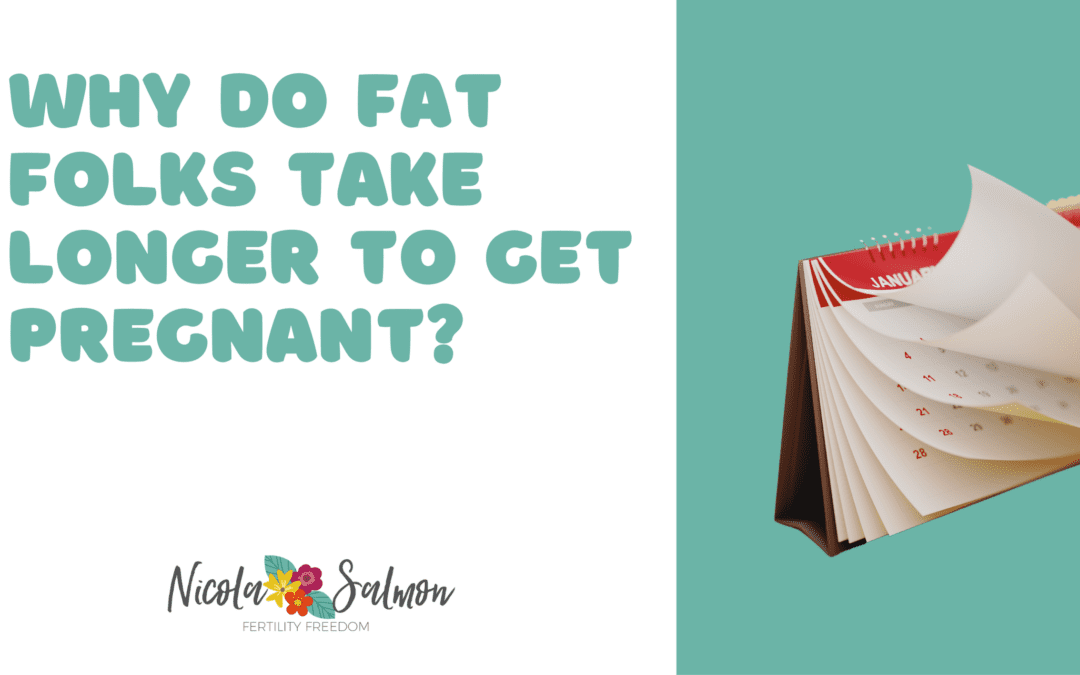If you want to get pregnant as a fat person, I’m sure you’ve heard all the negative ideas about trying to conceive.
One of these ideas is that it takes fat folks longer than people in smaller bodies. Is this true? And if it is, isn’t it just evidence that fat people need to lose weight in order to get pregnant? Let’s dive in!
The research showed that on average it took folks who were defined as “obese” using BMI categories two months longer to get pregnant than people with a BMI of 18.5-24.9. That doesn’t mean that there are less fat people getting pregnant, it means that it takes them a little bit longer. What the research doesn’t take into account is two huge factors that impact the health and fertility of fat folks – weight cycling and weight stigma.
Because maintaining long term weight loss is basically impossible, weight cycling (aka yo-yo dieting) is the inevitable reality for most people who attempt it. When your weight goes up and down rapidly over a relatively short time period, this repeated change in weight has been shown to negatively impact your health by increasing the risk of coronary heart disease and increasing blood pressure. Most, if not all, research on the dangers of obesity fails to take into account the fact that the majority of participants have been yo-yo dieting for large portions of their life and may still be dieting, which affects how their bodies function. Plus-size people are more likely to have experienced weight cycling in their lives, and that risk indicator isn’t accounted for in studies about their health.
Another way in which weight cycling has been shown to negatively affect health is by increasing chronic inflammation. Chronic inflammation can affect ovulation and hormone production and is linked with the occurrence of many fertility issues such as PCOS and endometriosis. So if you’re fat and trying to get pregnant or are already pregnant, it’s better to make sure you’re adopting or maintaining healthy habits and behaviors, rather than trying to lose a lot of weight fast.
Medical weight stigma is the prejudice that fat people face when they need to access health care. I’m not just talking about the internalised shame that they experience when talking about their weight to a medical professional. I’m talking about the fact that fat people get shorter appointment times with their doctors, are treated with less dignity, receive fewer test and treatment options, and experience longer periods of time before a diagnosis is reached. Health conditions in fat patients frequently go undiagnosed or misdiagnosed because their doctors tell them to lose weight and come back in six months. Because, as previously mentioned, weight loss is not a good solution to anything (much less everything), patients who try to follow this advice struggle to lose the weight (diets don’t work!) and come in far beyond the six-month mark, having lost none of the weight. Plus-sized patients often aren’t diagnosed until things get so serious that they can’t be ignored anymore.
Weight stigma is also linked to an increase in chronic inflammation due to the stress that fat people face when they have interactions with their healthcare professionals. Weight stigma means that it takes longer for people to receive fertility support and that wait time is a very real issue when it comes to fertility.
When weight cycling and weight stigma — two major risk indicators that most, if not all, fat people experience — are ignored in research, it is easy to draw a correlation between fertility issues and fatness.
Once you account for the damaging effects of weight cycling and the physical effects of weight stigma, the truth becomes clear: It is not weight that makes pregnancy more complicated when you’re fat; it’s diet culture and medical stigma.

Want to learn more about evidence-based fertility for fat folks?
Join me for an information and evidence-based workshop about fertility for fat folks.
During the on-demand 60 minute workshop we will explore:
- The REAL reasons why fat folks take longer to get pregnant
- Why dieting and weight-loss advice is not evidence-based
- Evidence-based practices that you can use to support your health and fertility
- The research behind the risks that fat folks face during pregnancy
There is a 30 minute Q&A at the end of the workshop and plus you also receive a 10 page PDF with resources and research articles.





